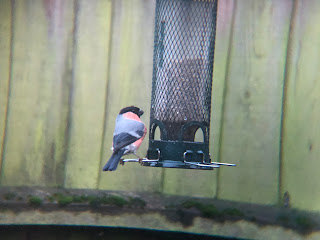Birding Ideas during Lockdown
If you're like me, you'll be continually trying to come up with ways to satisfy your birding hobby without leaving the house. I've tried to put together a list of all the ideas I can think of:
Garden Birding: of course the most simple thing you can do is bird watch in your garden or from your window. 'Lockdown Listing' has become really popular among birders. I'm on 45 from my suburban estate garden. Set a target for your garden and see how many you can see! Don't forget to upload your sightings to BirdTrack to help the BTO's citizen science initiative.
Patch Birding: just like with garden birding, lockdown doesn't have to mean the end to birding itself. Find an area you can walk to and visit here on your daily exercise walks. You don't even need to take binoculars - practise your naked eye/sound identification. If it's a new area you haven't birded before, who knows what you could turn up - you'll probably know it better than anyone by the end of the quarantine. I've discovered a regular site for Mistle Thrush and Yellowhammer just 400m down the road.
Improve your ID Skills: this is one for when you feel like doing some learning. A lot of people probably have great ID skills and these are often instinctive. But how often have you learnt by heart the key differences between Radde's & Dusky warblers? Could you pick out an American Golden Plover from a group of Golden Plover? Or could you confidently identify a Semi-P Sandpiper? Being stuck inside is a great chance to take stock and prepare your identification skills for that day that you're posed with the problem for real.
Self-Isolating Bird Club: this page on Twitter, ran by Chris Packham and Megan McCubbin is a great site for bird-related news and stories. Every morning at 9am, Chris and Megan run a spring watch-style live show which is a great way to get your wildlife fix without even leaving your bed.
Titchwell Marsh Live Microphone: now is a better time than ever to get better at identifying birds by sound. This is such a huge part of birdwatching and I'm sure all birders will agree that this will transform your birding ability. Titchwell Marsh RSPB have set up a live microphone in their reedbed. Not only does this offer a really relaxing soundscape that makes you feel like you're at Titchwell, but it's a great opportunity to practise your sound ID skills. 67 species have been identified by listeners so far.
TV Birding: this is one of my favourites. The rules are simple - record as many birds as you can identify on TV. A slight caveat on the rules is that the TV program cannot be explicitly about the birds themselves i.e. you cannot watch a show about Papua New Guinea and record all the Birds-of-Paradise. This makes it slightly harder and more like birdwatching, because spotting a Turkey Vulture soaring over a city during a cut scene in the Grand Tour is far more of a challenge than being shown one during a nature show. This is a great way of improving your identification of foreign and exotic birds and has the added benefit of being done while you watch TV!
Make a Nature Garden: now is your chance to put up bird boxes, grow a wildflower area or maybe even make a pond! There are lots of tips and advice online.
Bird ID Quiz: there are loads of great quizzes online to test your birding knowledge. Here are two of my favourites:
http://www.birdingquiz.com/birdtest/
http://www.computerbirding.com/what/cbirding_2018_e.php
Live Cams and Feeders: Live vicariously through live online cameras. There are loads of options to choose from. Maybe pick a country like the USA and learn some new birds?
Cornell Lab Feeders, African Drinking Hole, Rutland Ospreys, Bath Peregrines, Los Angeles Hummingbird Feeders
Noc-Mig: this involves recording the nocturnal migrants that pass over your house/garden in the dark and call as they do. It can be done by sitting in the garden at night or instead by recording the night's sound and looking through the recordings at a later time. Many birders are finding how revealing this can be - so many birds can fly over undetected in the cover of darkness that you would never otherwise know about. The Common Scoter migration was better documented than it ever has been before thanks to the increase in noc-miggers recently. https://nocmig.com offers lots of help for people getting started in this hobby. Typical birds you might add to your garden list are Tawny Owl, Moorhen and Coot, but you could be lucky enough to hear an unusual wader or maybe even an Ortolan Bunting! A classic nocturnal migrant.
Reading: there are some fantastic birding books out there - whether it's a travel book to inspire your dream trip after lockdown is over, identification books to practice your ID or maybe a book by a famous naturalist such as Chris Packham's Fingers in the Sparkle Jar. Or why not get the Birds of Spurn and take part in their first quiz this week? There's a huge range of books out there.
Garden Birding: of course the most simple thing you can do is bird watch in your garden or from your window. 'Lockdown Listing' has become really popular among birders. I'm on 45 from my suburban estate garden. Set a target for your garden and see how many you can see! Don't forget to upload your sightings to BirdTrack to help the BTO's citizen science initiative.
Patch Birding: just like with garden birding, lockdown doesn't have to mean the end to birding itself. Find an area you can walk to and visit here on your daily exercise walks. You don't even need to take binoculars - practise your naked eye/sound identification. If it's a new area you haven't birded before, who knows what you could turn up - you'll probably know it better than anyone by the end of the quarantine. I've discovered a regular site for Mistle Thrush and Yellowhammer just 400m down the road.
Improve your ID Skills: this is one for when you feel like doing some learning. A lot of people probably have great ID skills and these are often instinctive. But how often have you learnt by heart the key differences between Radde's & Dusky warblers? Could you pick out an American Golden Plover from a group of Golden Plover? Or could you confidently identify a Semi-P Sandpiper? Being stuck inside is a great chance to take stock and prepare your identification skills for that day that you're posed with the problem for real.
Self-Isolating Bird Club: this page on Twitter, ran by Chris Packham and Megan McCubbin is a great site for bird-related news and stories. Every morning at 9am, Chris and Megan run a spring watch-style live show which is a great way to get your wildlife fix without even leaving your bed.
Titchwell Marsh Live Microphone: now is a better time than ever to get better at identifying birds by sound. This is such a huge part of birdwatching and I'm sure all birders will agree that this will transform your birding ability. Titchwell Marsh RSPB have set up a live microphone in their reedbed. Not only does this offer a really relaxing soundscape that makes you feel like you're at Titchwell, but it's a great opportunity to practise your sound ID skills. 67 species have been identified by listeners so far.
TV Birding: this is one of my favourites. The rules are simple - record as many birds as you can identify on TV. A slight caveat on the rules is that the TV program cannot be explicitly about the birds themselves i.e. you cannot watch a show about Papua New Guinea and record all the Birds-of-Paradise. This makes it slightly harder and more like birdwatching, because spotting a Turkey Vulture soaring over a city during a cut scene in the Grand Tour is far more of a challenge than being shown one during a nature show. This is a great way of improving your identification of foreign and exotic birds and has the added benefit of being done while you watch TV!
Make a Nature Garden: now is your chance to put up bird boxes, grow a wildflower area or maybe even make a pond! There are lots of tips and advice online.
Bird ID Quiz: there are loads of great quizzes online to test your birding knowledge. Here are two of my favourites:
http://www.birdingquiz.com/birdtest/
http://www.computerbirding.com/what/cbirding_2018_e.php
Live Cams and Feeders: Live vicariously through live online cameras. There are loads of options to choose from. Maybe pick a country like the USA and learn some new birds?
Cornell Lab Feeders, African Drinking Hole, Rutland Ospreys, Bath Peregrines, Los Angeles Hummingbird Feeders
Noc-Mig: this involves recording the nocturnal migrants that pass over your house/garden in the dark and call as they do. It can be done by sitting in the garden at night or instead by recording the night's sound and looking through the recordings at a later time. Many birders are finding how revealing this can be - so many birds can fly over undetected in the cover of darkness that you would never otherwise know about. The Common Scoter migration was better documented than it ever has been before thanks to the increase in noc-miggers recently. https://nocmig.com offers lots of help for people getting started in this hobby. Typical birds you might add to your garden list are Tawny Owl, Moorhen and Coot, but you could be lucky enough to hear an unusual wader or maybe even an Ortolan Bunting! A classic nocturnal migrant.
Reading: there are some fantastic birding books out there - whether it's a travel book to inspire your dream trip after lockdown is over, identification books to practice your ID or maybe a book by a famous naturalist such as Chris Packham's Fingers in the Sparkle Jar. Or why not get the Birds of Spurn and take part in their first quiz this week? There's a huge range of books out there.





Comments
Post a Comment